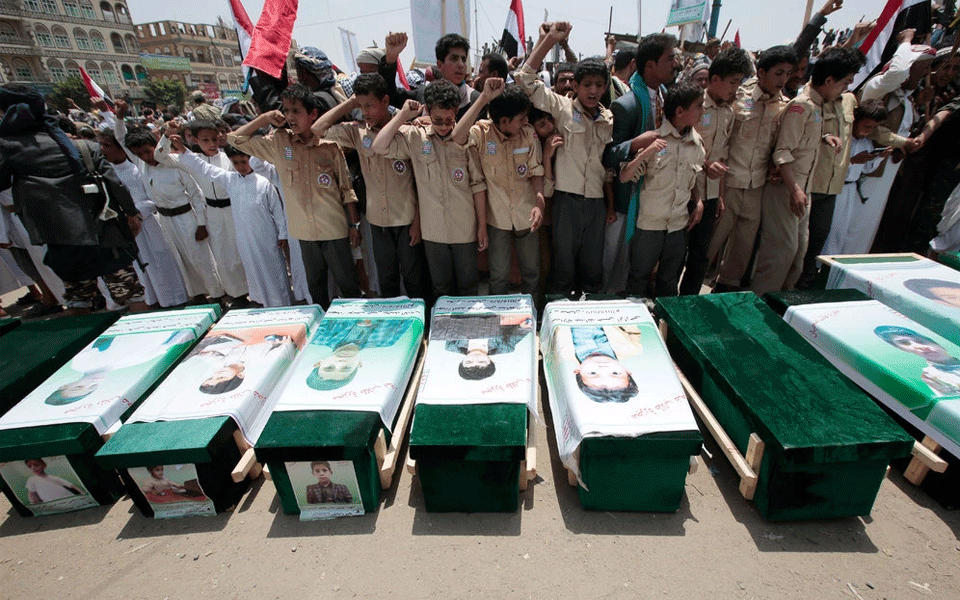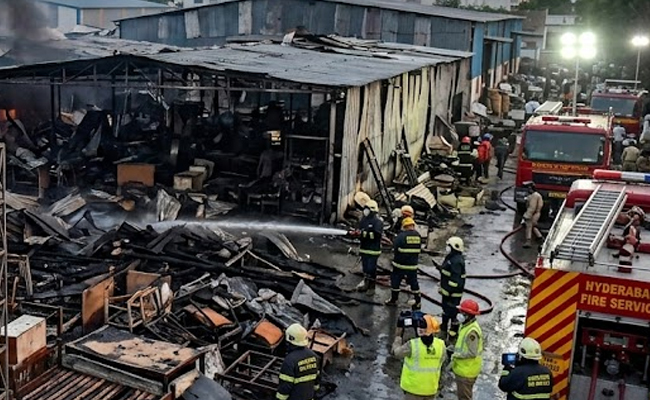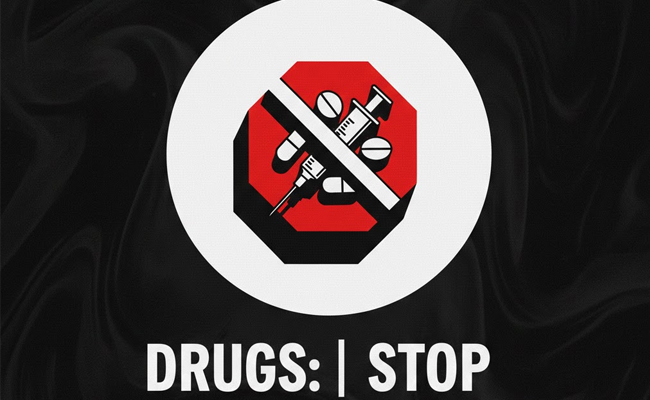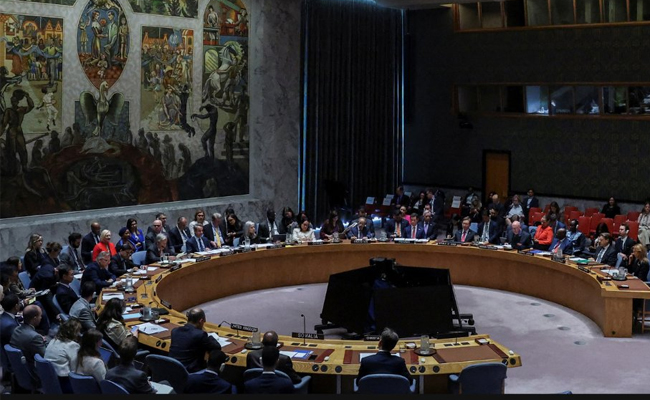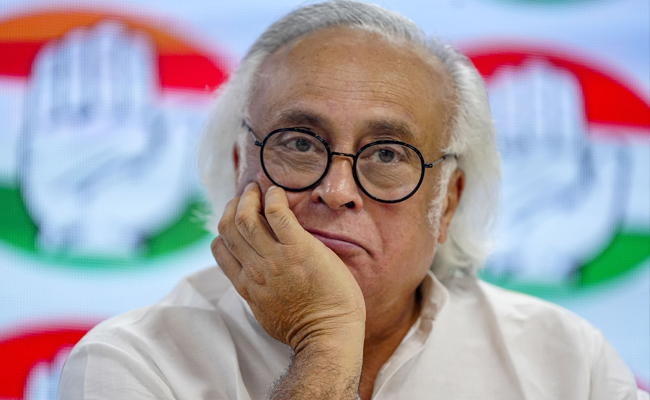RIYADH, Saudi Arabia sep 02: A Saudi-led coalition in Yemen acknowledged Saturday that an air attack last month that killed dozens of people, including children traveling on a bus, was unjustified, and it pledged to hold accountable anyone who contributed to the error.
The rare concession came after mounting international pressure, including from allies, to do more to limit civilian casualties in a 3½-year civil war in Yemen that has killed more than 10,000 people and pushed the already impoverished country to the brink of famine.
The Western-backed alliance fighting the Iranian-aligned Houthi rebels in Yemen had said after the Aug. 9 airstrikes, at a market in Saada Province, that it had been targeting missile launchers that were used to attack southern Saudi Arabia a day earlier. The alliance accused the Houthis of using children as human shields.
The Joint Incident Assessment Team, an investigative body set up by the coalition, said Saturday that the strikes had been based on intelligence indicating the bus was carrying Houthi leaders, a legitimate military target, but that delays in executing the strike and receiving a no-strike order should be investigated further.
"There was a clear delay in preparing the fighter jet at the appropriate time and place,” which cost the coalition the chance “to target this bus as a military target in an open area in order to avoid such collateral damage,” the team’s legal adviser, Mansour Ahmed al-Mansour, told reporters in Riyadh, the Saudi capital.
“Coalition forces should immediately review the application of their rules of engagement to ensure compliance,” he added.
The coalition later announced that it accepted those findings and pledged to hold accountable anyone who was proved to have made a mistake.
“The Joint Forces Command of the coalition expresses regret over the mistakes, extends its sympathies, condolences and solidarity to the families of the victims,” said a statement carried by the Saudi state news agency SPA.
The coalition said it would coordinate with the Yemeni government to compensate victims and would review the rules of engagement to prevent such episodes in the future.

The United States military welcomed the decision and praised the coalition’s move “to take legal measures to ensure accountability” and improve procedures to avoid future tragedies.
The Pentagon spokeswoman Dana White commented Saturday on the issue in a series of messages posted to Twitter.
The #DoD welcomes the #Saudi-led #Coalition’s announcement of the investigation findings of the targeting incident of August 9, 2018.
— Dana W. White - DoD (@ChiefPentSpox) September 2, 2018
Last week, a United Nations panel of human rights experts said that some coalition airstrikes may constitute war crimes. In Washington, Secretary of Defense Jim Mattis said American support for the Saudi-led coalition was not unconditional, but suggested it would continue as the coalition works to reduce the civilian toll.
The war has garnered relatively little public attention in the West, but there are signs that may be changing, particularly because of the role Western governments play in supplying arms to the coalition countries.
Saudi Arabia is leading an alliance of Sunni Muslim Arab states trying to restore the internationally recognized government of President Abdu Rabbu Mansour Hadi, who was ousted from the capital, Sana, by the Houthis in 2015.
The Houthis, who control the capital and most of the west of the country, regularly fire missiles on southern Saudi Arabia and occasionally aim for higher-value targets, such as Riyadh or facilities of the state oil company, Aramco.
The United Nations plans to convene talks in Geneva on Thursday, the first effort to negotiate the war in more than two years.
The war has devastated Yemen on several fronts, and scores of demonstrators in the southern city of Aden marched on Sunday against the deteriorating economic situation and weakening currency. The protesters blocked major roads and burned tires.
The Yemeni rial has lost more than half its value against the dollar since the start of the civil war. Soaring prices have put some basic commodities out of reach for many Yemenis, and the central bank has struggled to pay public sector salaries on which many depend as foreign exchange reserves dwindle.
The authorities have sought to boost liquidity by printing money, but the rial plunged to 350 to the dollar from 250 after the first batch of new notes was rolled out last year. It was trading at 440 to the dollar by the end of last year and crashed to around 500 in January.
Saudi Arabia has deposited $2 billion in Yemen’s central bank to shore up the rial, but the currency has since weakened further, to around 550 to the dollar.
Courtesy: nytimes.com
Let the Truth be known. If you read VB and like VB, please be a VB Supporter and Help us deliver the Truth to one and all.
Hyderabad (PTI): As many as 22 temporary roadside sheds where furniture was manufactured and sold have been gutted after a fire broke out in one of them here, and no one was injured in the incident, police and fire department officials said on Wednesday.
This massive fire accident occurred in an area under the Bachupally police station limits at around 11 pm on Tuesday. After originating in one of the sheds, the flames spread quickly to adjacent sheds, destroying wooden furniture and other materials required for manufacturing furniture.
Six fire tenders were rushed to the spot, and the fire was extinguished, a police official said.
Based on preliminary investigation, the official said the blaze started due to a short circuit.
Eye-witnesses have stated that there was a short circuit on a pole, and the wire fell onto the sofas, which caught fire. Within minutes, the fire spread, police said.

